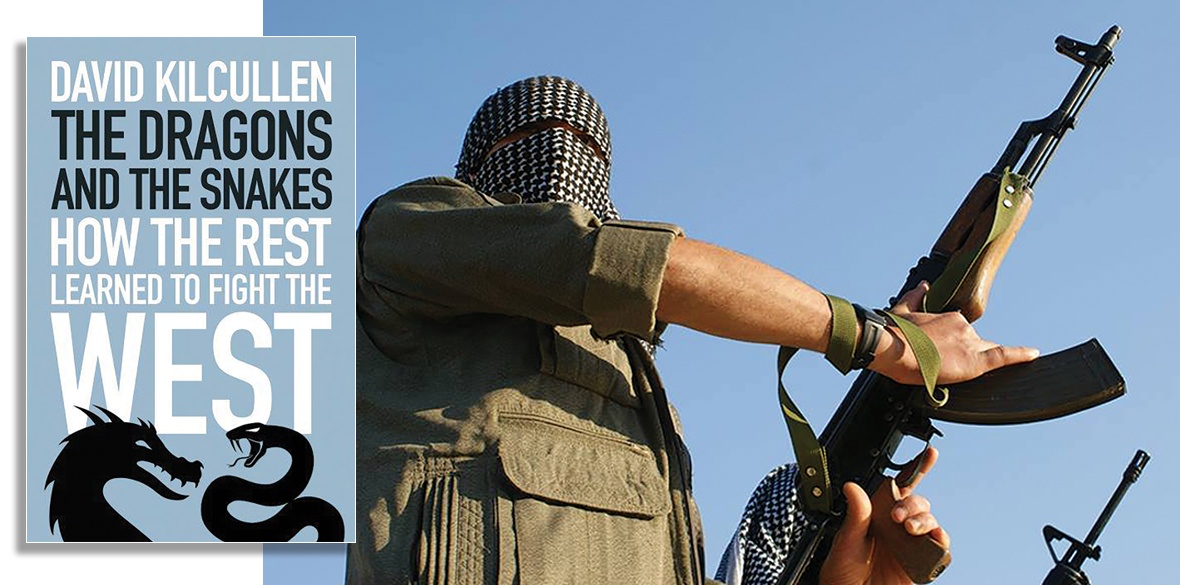This is the last article you can read this month
You can read more article this month
You can read more articles this month
Sorry your limit is up for this month
Reset on:
Please help support the Morning Star by subscribing here
The Dragons and the Snakes: How the Rest Learned to Fight the West
David Kilcullen
Hurst, £12.99
A DISTURBING theoretical premise underpins every sentence of David Kilcullen’s comprehensive treatise about 21st-century conflict.
It is that human society exists in a permanent state of war, overt and covert, in which competing powers and forces, if not actively seeking to destroy each other by military means, nonetheless share a condition of perpetual hostility and are forever poised to press the button on some new secret weapon that will afford them the global domination they crave.
This is a harsh but arguably dominant precept of international relations — the so-called realist school in which human selfishness and aggression steer statecraft, making conflict inevitable — and will be instantly recognisable in Kilcullen’s work to scholars in this field.
The Dragons and the Snakes certainly pulls no punches, arguing that as the US-dominated military alliance guaranteeing a world order that serves Western liberal interests has lost its mojo after failures in Iraq and Afghanistan, its enemies — muscular states such as Russia, China, North Korea and Iran as well as deadly non-state actors such as Isis etc — have learned how to identify and exploit its deepening weaknesses.
None of this should come as a surprise. The upshot is that the Western military model based on unprecedented battlefield dominance exemplified by US shock and awe in the 1991 Gulf war — what Kilcullen describes as the “high-tech, high-precision, high-cost suite of networked systems” — is no longer fit for purpose.
“Our enemies have adapted … and unless we too adapt our decline is only a matter of time.”
The title of the book derives from a comment by James Woolsey, head of the CIA in that brief era of US triumphalism following the end of the cold war, and is used by the author to reference a “convergent evolution” in the hostile tactics used by dragons (states) and snakes (terrorists) in their opposition to Western liberalism.
Kilcullen is an expert in his field able to deploy unrivalled knowledge, and The Dragons and the Snakes is an impressive piece of scholarship.
Yet that does not make it watertight. Critics of realism argue that this belligerent theoretical perspective is indeed heavily based on statecraft and that adherence to it may actually serve to perpetuate the confrontational world that it depicts in a form of self-fulfilling prophecy.
While Kilcullen points to several weaknesses in the authoritarian systems of Russia and China that the West can exploit, not least a growing aversion to casualties, there is little effort to engage with their political fault-lines and class dynamics.
There is a reason the democratic activist Alexei Navalny languishes in the gulag: Vladimir Putin fears him. Moreover, in China Covid has unleashed unprecedented levels of criticism against the regime and the economy is slowing.
None of this is to say that these regimes are about to topple, saving the West’s bacon — but Kilcullen plays down their self-evident domestic weaknesses. Russia, after all, was home to the mother of all revolutions.
Nor does the author address economic warfare in any meaningful sense — the Ukrainian crisis shows us that wars aren’t just waged through military might, but through trade, currencies and bank accounts.
In short, Kilcullen’s thesis can be reduced largely to the vague statement that modern warfare has become a mess of hybrid techno solutions, some of which are non-lethal, slow, and civilian, that detract from old-fashioned bombardment.
As a result, his prescriptions for a fearful and declining West are equally vague. They amount to doing what your enemies are doing, but better.










